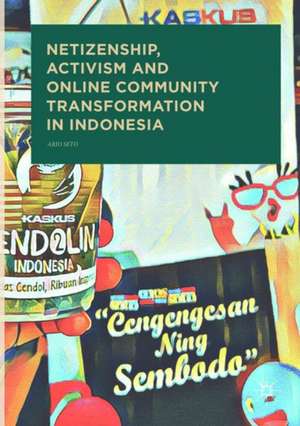Netizenship, Activism and Online Community Transformation in Indonesia
Autor Ario Setoen Limba Engleză Paperback – 12 dec 2018
| Toate formatele și edițiile | Preț | Express |
|---|---|---|
| Paperback (1) | 524.70 lei 6-8 săpt. | |
| Springer Nature Singapore – 12 dec 2018 | 524.70 lei 6-8 săpt. | |
| Hardback (1) | 699.45 lei 6-8 săpt. | |
| Springer Nature Singapore – 22 sep 2017 | 699.45 lei 6-8 săpt. |
Preț: 524.70 lei
Preț vechi: 617.28 lei
-15% Nou
Puncte Express: 787
Preț estimativ în valută:
100.41€ • 105.58$ • 82.96£
100.41€ • 105.58$ • 82.96£
Carte tipărită la comandă
Livrare economică 17 aprilie-01 mai
Preluare comenzi: 021 569.72.76
Specificații
ISBN-13: 9789811353871
ISBN-10: 9811353875
Pagini: 255
Ilustrații: XXVII, 255 p. 4 illus.
Dimensiuni: 148 x 210 mm
Greutate: 0.34 kg
Ediția:Softcover reprint of the original 1st ed. 2017
Editura: Springer Nature Singapore
Colecția Palgrave Macmillan
Locul publicării:Singapore, Singapore
ISBN-10: 9811353875
Pagini: 255
Ilustrații: XXVII, 255 p. 4 illus.
Dimensiuni: 148 x 210 mm
Greutate: 0.34 kg
Ediția:Softcover reprint of the original 1st ed. 2017
Editura: Springer Nature Singapore
Colecția Palgrave Macmillan
Locul publicării:Singapore, Singapore
Cuprins
Clicked Participation.- The Structure of an Online Community.- Going Offline, Order and The environment.- Netizenship: Between Ignorance and Prudence.- Bricked and Buried: Sanctions Against Fake News.- The Unsettled Online Community.- Conclusion: We Need More Red Bricks.
Notă biografică
Dr. Ario Seto is a Lecturer at Universitas Indonesia and Researcher at Frankfurt University, Germany. He obtained his Masters of Arts from Passau University, Germany and Ph.D from Frankfurt University, Germany. His research focus areas are pop culture, citizenship, digital practices, community engagement and urban studies. Besides conducting a research on Islamism de-radicalization in Southeast Asia’s digital sphere, he is also currently teaching cultural sociology and research method at the University of Indonesia.
Textul de pe ultima copertă
Focusing on the concept of prudence as ethical groundwork for digital practices and activism, this book considers digital media expediency and populism as conflicting required experiences that lead digital citizens to discover activism. It highlights the importance of digital citizens’ experience of ‘being-in-the-digital sphere’ and encourages the reader to look at the dynamics of online movement as a part of a community’s search for significance between the online and offline realms of activism. Based on ethnographic research about the largest Indonesian online community, Kaskus, this book uses Indonesian digital citizenship as an example of online activism in a post-authoritarian state, with media viewed as a tool for democratic advancement and a catalyst for social movements among activists, students, and citizens both in Indonesia and further afield. Set at the intersection of media anthropology, sociology, Asian studies, and Citizenship studies, this book considers the shape and future of digital democracy in post-authoritarian state.
Caracteristici
Considers the shape and relevance of digital democracy in post-authoritarian states Argues that sustainable online movements rely on online community exposure to re-connection and recognition to the the state, the city and the offline society Examines how media anthropology can approach the dynamic of online communities
